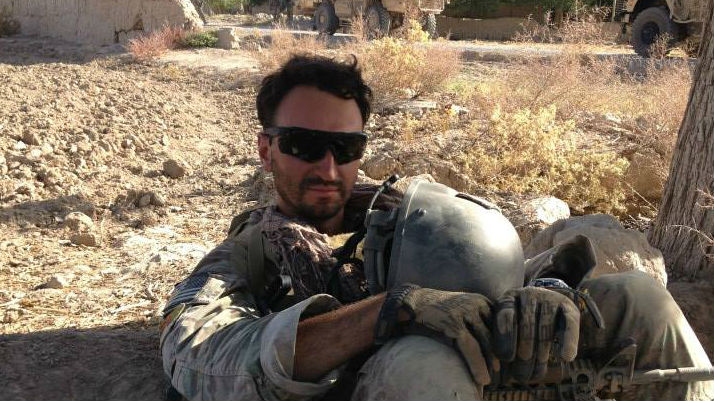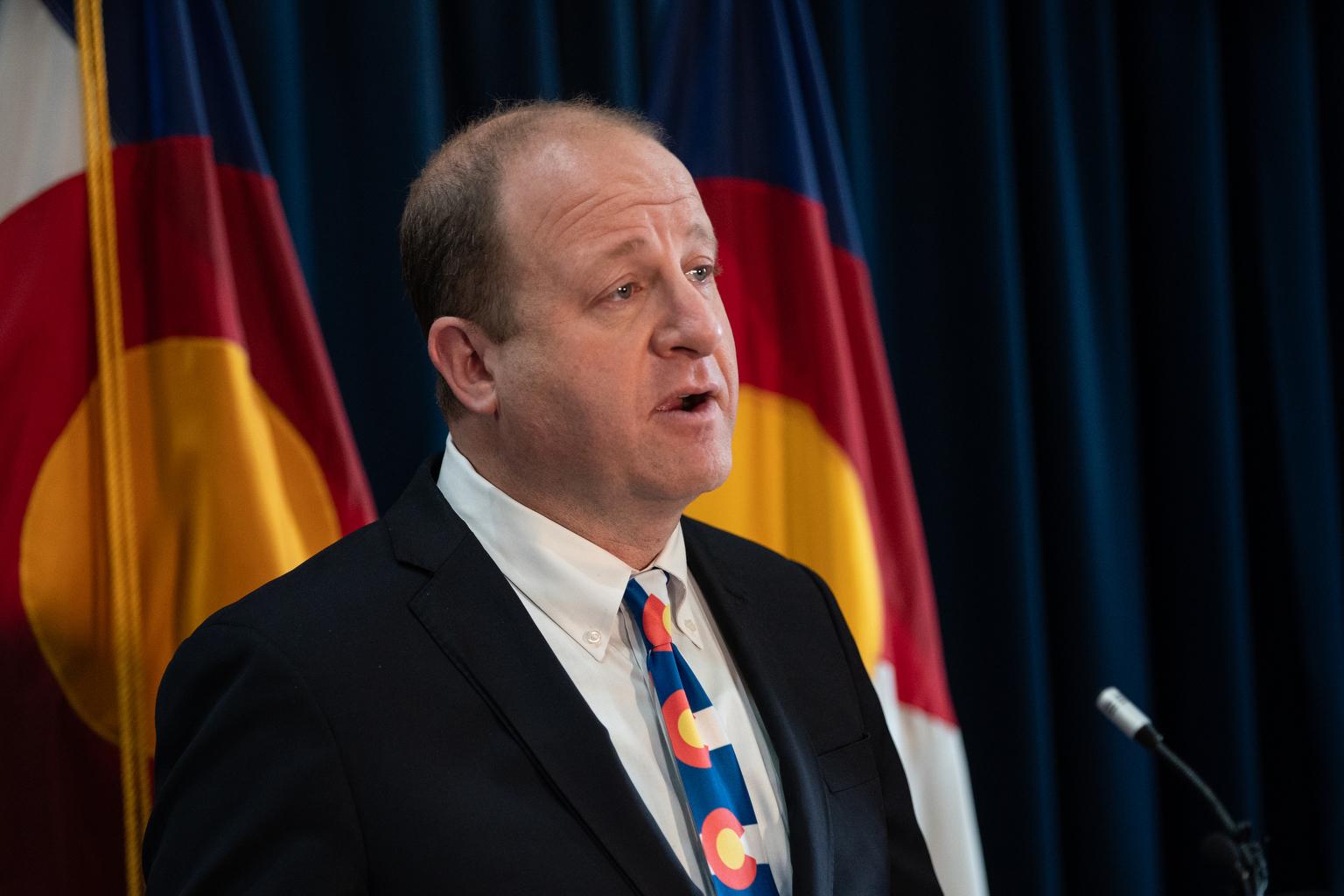

Editor's Note: This story originally aired in November 2015. We're re-airing it in honor of Memorial Day.
Matthew Novellino of Boulder says he inherited a duty to serve his country. His father was a paratrooper with the 101st Airborne Division during Vietnam, and his grandfather served in World War II. Novellino joined the military in 2003, eventually becoming a Green Beret with the U.S. Army Special Forces. He was deployed to Afghanistan for six months in 2013.
He returned to Colorado, and during a hike, he had a flashback to his time in combat. That inspired his prose titled "Pop'n Twigs," which is also a chapter of a book he's working on. Novellino continues to serve with the Army Special Forces and the National Guard. He's also an active participant in the Boulder veteran arts community.
Read Novellino's prose:
"Pop'n Twigs" Standing on a narrow trail halfway up the foothills of the Rocky Mountains, I thought about that moment again. The sun was painting every rock and illuminating each leaf, and the glowing green soothed me. But as I watched the Aspens quake, a crisp moment resurfaced: Small, juicy green leaves fluttering on little white twigs in the breeze. The memories didn't bother me most of the time, and why should they? I had been well prepared for combat, and more importantly, I'd been lucky. Those incidents were nothing more then normal things that happened every day in Afghanistan. With a detached curiosity, I replayed the scene in my mind: Little twigs snapping off above my head. Delicate, white, little twigs with pretty little green leaves on them. Overheated, dehydrated, adrenalized for hours — I had just run back toward the cover of the armored wrecker truck. A few paces before reaching its protection, I'd slowed to a walk. It was my first fire-fight, and several hours in, I had already grown dangerously complacent about gunfire. My complacency was partially due to the fact that I hadn't yet fully comprehended the different sounds bullets made when they passed near by, and what those sounds could tell you. That, I would learn in time. Safe in Colorado, I didn't recall a single emotion while I watched, slack-jawed, as those tiny white twigs popped and summer-salted to the earth next to me. I'd always heard veterans talk about how vivid their memories were of first combat, even decades after the fact. For me, there were large chunks of my days in battle that were blurry at best, and that was beginning to annoy me. So I was standing behind that armored wrecker, looking out across the golden field towards the long mud-built walls and compounds to the East. Fire had been coming from that direction all day, and somewhere enemy guns still sent bullets popping. A lot had happened since the mission kicked off shortly after 0330 that morning. Now it was around noon, and the temperature had risen to above 120 degrees Fahrenheit. I had begun the dark of that morning as someone who had never been shot at before. Now — seven hours into it — the sustained sound of gunfire seemed like the natural backdrop of my existence. Though I was standing static at that moment, trying to conserve precious drops of energy, my mind wasn't still. I scanned constantly, hoping to catch a glimpse of something in a distant, roughly formed window, or hole in a wall, that I would be justified in shooting at. But the enemy had set up his fighting positions well, and the only people I could see were a woman in a bright dress, and a boy in black working near her. They lingered in a small patch of crops next to a mud house with tiny It was amazing how casual the villagers were about combat in this town. Most had bugged out of the area on this particular morning, but I'd seen a few, and just accepted them as a natural part of this bizarre enterprise I was involved in. All kinds of fire had raked that field from both directions, yet that boy and woman sat almost motionless in their sparse garden as if nothing were going on. As an American soldier, I wouldn't entertain the idea of shooting anywhere near civilians, unless it was to put precision fire on a visible enemy with a weapon. Since the Taliban didn't wear uniforms and were known to put their guns down when moving between stocked fighting positions, making positive identification — what we called PID — could be rather difficult. So, with rounds still emanating from the field, I scanned hopefully, but held my fire as was appropriate. The Afghan soldiers who fought with us did not feel bound by the same guidelines. About fifty meters to my left, First Sergeant Shafiq was up in the turret of a HUMVEE, blasting away with gusto on an M-240 machine gun. Does he have a fix on the enemy machine gunner? I wondered. Only a small handful of us were holding this part of the road at that late and spread out stage of the fight, so his energetic duel with the opposite gunner seemed more then appropriate from where I stood. Hollow-eyed, I peered across the field, trying to glean anything actionable from the scene before me. Now I saw something that wasn't right, even by the standards of the day. The woman and boy were still sitting in their garden, or were they on their knees? My heart began to pound as I realized the long bursts of bullets from Shafiq's machine gun were tearing up the earth around the two civilians, sending up momentary spouts of dirt within feet of where they held frozen. There were no warning bells left to go off in my head, but still I said to myself, I have to go tell Shafiq that there is a woman and child over there. Yes...No. That is not what we do. I have to go tell Shafiq. Even with a transmission of doubt crackling in my brain, I decided to move from behind the armored vehicle. What I perceived as my duty to deliver that message trumped all other considerations. In a war that often lacked clarity, one thing was clear in my mind. We don't knowingly harm civilians, and it is our job to protect women and children, no matter where they are from. That was core to my belief in what a U.S. soldier could still bring to a world clogged with shady politics and hidden motives. It was core to the warrior code that I had adopted in my mind starting at I broke cover from behind the armored vehicle, and ran up the open street exposed to the field. Just to the rear of the HUMVEE that Shafiq was firing from stood an interpreter that I knew. He was a tough guy, very reliable, and he also happened to be the biggest Afghan that I or any other American had ever seen. Somewhere along the way, someone had bestowed him with the name “Thor,” and it stuck. Shafiq didn't break his focus on the sights of his machine gun as I drew near the HUMVEE. “Hey!” I yelled as I came to a stop next to the vehicle. “Thor, there is a woman and a kid over there. Tell him to stop shooting.” Thor moved over from where he was standing and got Shafiq's attention to deliver my message. The Afghan First Sergeant stopped firing just long enough to look down at me with annoyance, and give his reply in Dari. Thor turned to me and said simply, “They are shooting at us from there.” He shrugged, and returned slowly to his position behind the HUMVEE. As Shafiq got back on the trigger, I turned my confused gaze in the direction of the target in question. With a long squeeze, he sent a nice line of rounds stitching through the dirt, right past the woman and boy, and into the wall behind them with the small windows. I squinted, trying to see through a fog that didn't exist. I guessed the enemy gunner was firing from one of those windows behind the woman and child, but why hadn't they moved? I felt helpless. I couldn't kill the bad guys, and I couldn't protect the innocent, who were apparently on their knees not moving. Or maybe they were sitting? Shafiq and the Taliban gunners, wherever they were, weren't going to stop shooting while I tried to figure it out. I was in their world and didn't know much. The one thing I did know was that I probably shouldn't stand there any longer, so I turned back towards where I had come from. This is where things get blurry again. Maybe it was the oppressive heat or the fatigue, or the conundrum in my head. How fast did I run back between the two vehicles? How many times had I been shot at that day that I casually sauntered the last few feet towards the bumper of the wrecker? I had grown numb to the sonic crack that occurs when 7.62 millimeter rounds come overhead. I was facing in the direction that I had been running when I stopped, and to my right I saw little white twigs, with plump little green leaves on them, snapping off of the tree branches. I realized that I should step behind the truck, and I did. Ten months after that fire-fight, and five months after returning from Afghanistan, I stood alone amidst the beauty of Spring in the Rockies, replaying this curious little memory in my head. I marveled now at the fact that the woman and boy I had seen kneeling in the field, directly in front of the Taliban machine gun position, were dummies. Were they just scarecrows meant to keep birds out of the veggies, or were they purposely built to scare away American bullets? Either way, the Taliban gunner had intentionally set up his position behind them. He was confident enough in the fact that American soldiers don't shoot at women and children that he trusted his own life to the decoys. What he hadn't counted on was a uniquely committed and reasonably crazy Afghan First Sergeant with an American machine gun, who either wasn't impressed by the rouse, or simply wasn't going to let a couple of civilians on the battlefield keep him from his enemy. In Afghanistan, it was just another one of those things, like being amused by tiny tree branches twirling through the air while someone was trying to kill you. Like the fact that they were shooting at me because I broke cover to try and protect what I thought was an Afghan woman and child. I had come to accept and even embrace these things. It was how I did my job. A job that I frankly loved. But now I had been back in what we for some reason called “the real world” for a bit too long, and those little brushes with death were starting to seem more concerning. The comfort of commonplace was beginning to fade, and now those experiences demanded to have meaning for some reason, only it is hard to pull meaning out of hazy, heat soaked, and all too surreal memories. As I stood thousands of miles from the battlefield, surrounded by the beauty of Colorado, I was still unable to recall any significant emotion as I watched those little twigs getting shot from the branches above my head. What did change was that now there was a distinct feeling of fear and realization associated with that little video clip in my heart. What was normal in Afghanistan was not normal here, and now months after coming home, it was just beginning to sink in. My God, I thought, there were dozens and dozens of these memories to process, and a lot of them were loaded with way more baggage then this one tiny scene from a dusty village called Jangal Rud. POP'N TWIGS reprinted with permission from Matthew Novellino. |









